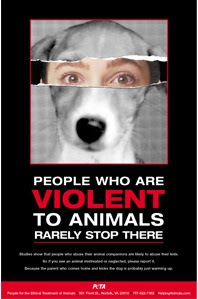 We live in a violent society. Many people have been taking notice of a certain connection. A connection between animal cruelty and human abuse. In an article by John Locke called “Cruelty”, he makes note of how, we as a society, would exclude “butchers from juries of life and death”. He felt that these men have become desensitized and could not truly see the court case for what it is. It was his thought that butchers have become desensitized by the “cruel” acts they perform on animals.
We live in a violent society. Many people have been taking notice of a certain connection. A connection between animal cruelty and human abuse. In an article by John Locke called “Cruelty”, he makes note of how, we as a society, would exclude “butchers from juries of life and death”. He felt that these men have become desensitized and could not truly see the court case for what it is. It was his thought that butchers have become desensitized by the “cruel” acts they perform on animals.The topic of desensitization in kids is touched on in Mead’s article “Culture Factors”. As television gives us more and more graphic shows and parents allowing kids to watch more adult shows, we as a society have turned off or blocked something in the human mind. When you see a dead body, do you feel anything? Probably, but with shows like CSI, Criminal Minds, and many more we tend not to be fazed by a body sitting on a table sliced opened. The graphic shows I watch are CSI: NY, NCIS, and Criminal Minds. I know the difference in a body that is made up for TV and one that is hanging out of a car window. But do these shows desensitize me and how I feel? If they do, how do they affect the growing mind of a child? We also have to look at video games that kids are playing today. So how are children to distinguish what is right and wrong when it comes to killing? As Mead stated, “Pests to be killed, food to be eaten, pets to be loved, are discriminated for the growing child.” We, as the adults, need to help guide these kids. We need to let them know what is right and wrong.
We, as parents, need to be aware of what kids are doing and why. There are people that believe that people that cause animal cruelty are psychopaths (“It is an undeniable fact that cruelty of any kind has its roots deeply buried in psychopathology”), I agree with a different mind set that states, “researchers cannot assume that animal abusers are ‘psychopaths’, ‘cold- blooded killers’, or ‘sadists’ thought to act impulsively without reason”, but we need to look deeper into the reasons why they are doing what they do. Kids tend to act out for various reasons, but that does not make them killers or rapist. It makes them human. It’s when they step over the line that parents need to worry.
But if a child acts out and kills an animal, what do we do? We cannot let this incident go unpunished. Mead says that if we do not punish the child for something that is “tabued”, then there is the possibility that the child will “try it again (or) try something bigger”. Parents and educators need to understand that any type of cruelty is a cry for help in some way. We need to pay more attention to our kids and try to find out what is bothering them. If the cruelty increases with the child, there is a chance that this child will grow to be a burden to society. But how can we do this when our lives are so busy? How can we keep an eye on everything a child does?
As with anything in animal welfare, education is the key. We need to help educate the public on the different signs that can be linked to animal cruelty. Many people have no perception or a very small idea of what can happen to a child that commits animal cruelty. Someone who abuses animals may have some physiological problems; they may grow up to be abusive or worse a murderer. Shelters need to have an outreach program that goes into schools to talk with young people about animal abuse. We need to teach teachers to be aware of what to look for in kid’s behavior and then what to do to help. We tend to leave this to the police or local authorities, but we need to step up and help guide the police and the local authorities in looking for certain signs and what to do and whom they should contact if they see these signs of animal abuse. The police may only know to call child services and not the local shelter if an animal is involved.
The mind is a vast machine that can break down. When this happens, things go wrong for many reasons. People are angry with someone who did them wrong, so they want revenge. Kids are left out, ostracized and made fun of and they tend to act out, sometimes violently. We have no real understanding of where violence comes from, but at some point in everyone’s life there was a violent act or thought. We need to learn to understand our emotions. Cruelty is a desire and a readiness to give others pain without feelings or remorse. We all just need to heed the signs.



No comments:
Post a Comment